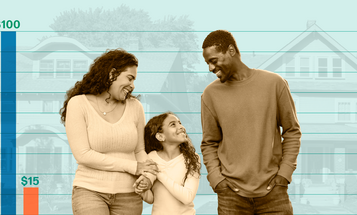
Don’t Let the Coronavirus Crisis Drive Black and Brown Families Further into Debt
The pain of COVID-19 job loss and income disruption is layered on top of the nation’s deep pre-existing racial and economic inequalities.

COVID-19 is a threat to everyone, but the economic damage resulting from medically necessary quarantines and shelter-in-place orders is neither random nor equally distributed. As millions of Americans are thrown out of work or see their hours cut, the pain of job loss and income disruption is layered on top of the nation’s deep pre-existing racial and economic inequalities, produced by discriminatory policies of the past and present. If policymakers leave households to struggle through the economic crisis with only the minimal aid Congress has provided so far, this inequality will worsen dramatically.
[A]ny economic shock—including the necessary public health response of closing down businesses and schools—hits Black and brown workers especially hard[.]
Many Americans, especially in Black and brown communities, were barely getting by even during the recent period of economic growth before the coronavirus struck. During the “best” of times, families were already struggling with unpayable debt, high rent, and soaring health care costs. Structural racism and ongoing discrimination have shaped American labor markets so that Black and brown Americans are disproportionately employed in low-paying, precarious service sector jobs that are less likely to include critical benefits like health coverage and paid sick time. As a result, any economic shock—including the necessary public health response of closing down businesses and schools—hits Black and brown workers especially hard: Black and Latinx workers are less likely to be employed in jobs that can be done from home than white or Asian workers, and are losing their livelihoods as a result. In hard-hit New York City, for example, Latinx workers have been thrown out of work in the highest numbers, with 41 percent of Latinx New Yorkers saying either they or a household member lost their job since the city took public health measures to shut down many workplaces.
Even as they are battered by job loss, Black and brown workers typically have fewer resources than white workers to cope with unemployment. Decades of discriminatory public policies and corporate practices systematically excluded Black and Latinx families from wealth-building opportunities that benefitted white families, producing vast wealth inequality that persists to this day: For every dollar in wealth held by the typical white household, the typical Black household has just 10 cents, and the typical Latinx household has just 12 cents. In 2016, nearly 1 in 5 Black families had negative net worth—meaning their debts exceeded the total value of assets like a home, car, or bank account. With less wealth to draw on, Black and Latinx households struggling with job loss or reduced work hours as a result of COVID-19 will more quickly exhaust their resources and be unable to pay rent and other bills. Many will need to borrow, turning to credit cards and other loans, to buy groceries and other necessities. Numerous white households may also fall behind on bills and go into debt, yet persisting racial wealth inequality makes the shortfall steeper and more likely for Black and brown households.
The Trump administration is counting on household debt to make up the difference for struggling families.
Congress’s latest economic relief plan offers critical support for families—sending needed funds directly to low- and middle-income households and expanding unemployment benefits—but it falls far short of addressing the economic crisis that is projected to throw nearly 20 million people out of work. The Trump administration is counting on household debt to make up the difference for struggling families. Waving away concerns about the high-interest loans that have drained wealth from Black and brown communities for decades, 5 federal regulatory agencies are now encouraging banks to promote small-dollar loans, many of which will carry elevated interest rates, to people confronting financial hardships as a result of the coronavirus outbreak.
Since Black and Latinx consumers are already more likely to struggle with bad credit as a result of racial wealth inequality and ongoing discrimination[,] they stand to be hardest hit.
Borrowing to cope with the COVID-19 crisis will not only burden households with additional debt payments, it threatens to damage Americans’ credit for years to come, jeopardizing their future access to housing and jobs. This is because credit reporting companies treat late payments and unpaid debt that result from a global pandemic the same way as bills that go unpaid when consumers manage their finances irresponsibly. Anyone who doesn’t pay a bill on time is portrayed as a poor credit risk, and will accordingly be charged a higher interest rate if they try to buy a home, get a credit card, or take out a small business loan years into the future. In states where employers can legally check the credit reports of job applicants, unpaid bills resulting from the coronavirus crisis could also be grounds to deny employment. Since Black and Latinx consumers are already more likely to struggle with bad credit as a result of racial wealth inequality and ongoing discrimination, and have fewer financial resources for the same reasons, they stand to be hardest hit. If the economy is left to take its current course, racial wealth inequality will grow exponentially.
Across the country, advocates and activists are making the case for solutions that would disrupt the cycle of inequality and injustice. At the very least, Congress should pass legislation prohibiting negative information from appearing on credit reports during the coronavirus crisis and in the months that follow. So far, lenders have succeeded in blocking even this basic step to protect struggling households. Yet much stronger measures are needed: To prevent coronavirus hardships from becoming long-term, racially inequitable debt burdens on households, we need paid leave that covers every working person; free treatment for COVID-19 (a step towards universal health care for all ailments); a moratorium on rent, mortgage, and utility payments; cancellation of federal student debt (not just suspending payments and interest as Congress has done); child care for all essential workers; and a freeze on all debt collection. Policies must fully include immigrant families and incarcerated people, groups that have been largely excluded from relief so far. What these policies have in common is that they treat the coronavirus pandemic as what it is: a society-wide crisis that demands society-wide economic and public health responses, not 329.5 million individual problems that households are left to go into debt trying to cope with on their own. Any policy that fails to do this will deepen existing inequalities and leave Black and brown families further behind.




